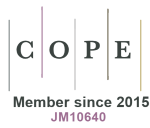Altered amino and fatty acids metabolism in Sudanese prostate cancer patients: insights from metabolic analysis
DOI:
https://doi.org/10.33393/jcb.2024.3146Keywords:
Africa, Metabolomics, NMR, Prostate cancer, SudanAbstract
Introduction: Prostate cancer (PCa) management presents a multifaceted clinical challenge, intricately linking oncological considerations with cardiovascular health. Despite the recognized importance of lipid metabolism and hypertension in this interwoven relationship, their involvement in PCa development remains partially understood. This study aimed to explore variations in plasma metabolome among Sudanese PCa patients and their associated comorbidities.
Methods: Plasma samples were collected from 50 patients across four hospitals in Sudan and profiled by nuclear magnetic resonance (NMR) spectroscopy. One-dimensional proton NMR spectra were acquired for each sample using standard nuclear Overhauser effect spectroscopy pulse sequence presat on a 500 MHz Bruker Avance III HD NMR spectrometer. Metabolite concentrations were quantified using R scripts developed in-house. Univariate and multivariate analyses were generated in the R software.
Results: Patients were categorized into four distinct metabotypes based on their metabolic profiles, and statistical analyses were conducted to evaluate the significance of observed differences. Our findings revealed high levels of fatty acids, phospholipids, cholesterol, valine, leucine, and isoleucine associated with non-hypertensive patients. In contrast, hypertensive patients were associated with high GlycA and GlycB levels and altered amino acid metabolism.
Conclusion: These findings underscore the intricate interplay between metabolic dysregulation and hypertension in PCa patients. Further research is warranted to elucidate the precise molecular pathways underlying lipid metabolism in PCa and to explore the therapeutic potential of targeting these pathways. In conclusion, our study contributes to a deeper understanding of the metabolic landscape of PCa in Sudanese patients, emphasizing the importance of personalized approaches in cancer management.
References
- Bray F, Ferlay J, Soerjomataram I, Siegel RL, Torre LA, Jemal A. Global cancer statistics 2018: GLOBOCAN estimates of incidence and mortality worldwide for 36 cancers in 185 countries. CA Cancer J Clin. 2018;68(6):394-424. https://doi.org/10.3322/caac.21492 PMID:30207593 DOI: https://doi.org/10.3322/caac.21492
- Choi Y, Park B, Jeong BC, et al. Usefulness of early extracorporeal shock wave lithotripsy in colic patients with ureteral stones. Korean J Urol. 2015;56(12):853-859. https://doi.org/10.4111/kju.2012.53.12.853 PMID:23301130 DOI: https://doi.org/10.4111/kju.2012.53.12.853
- Wasim S, Lee SY, Kim J. Complexities of prostate cancer. Int J Mol Sci. 2022;23(22):14257. https://doi.org/10.3390/ijms232214257 PMID:36430730 DOI: https://doi.org/10.3390/ijms232214257
- Danzi F, Pacchiana R, Mafficini A, et al. To metabolomics and beyond: a technological portfolio to investigate cancer metabolism. Signal Transduct Target Ther. 2023;8(1):137. https://doi.org/10.1038/s41392-023-01380-0 PMID:36949046 DOI: https://doi.org/10.1038/s41392-023-01380-0
- Li Z, Zhang H. Reprogramming of glucose, fatty acid and amino acid metabolism for cancer progression. Cell Mol Life Sci. 2016;73(2):377-392. https://doi.org/10.1007/s00018-015-2070-4 PMID:26499846 DOI: https://doi.org/10.1007/s00018-015-2070-4
- Kdadra M, Höckner S, Leung H, Kremer W, Schiffer E. Metabolomics biomarkers of prostate cancer: a systematic review. Diagnostics (Basel). 2019;9(1):21. https://doi.org/10.3390/diagnostics9010021 PMID:30791464 DOI: https://doi.org/10.3390/diagnostics9010021
- Vandergrift LA, Decelle EA, Kurth J, et al. Metabolomic prediction of human prostate cancer aggressiveness: magnetic resonance spectroscopy of histologically benign tissue. Sci Rep. 2018;8(1):4997. https://doi.org/10.1038/s41598-018-23177-w PMID:29581441 DOI: https://doi.org/10.1038/s41598-018-23177-w
- Struck-Lewicka W, Kordalewska M, Bujak R, et al. Urine metabolic fingerprinting using LC-MS and GC-MS reveals metabolite changes in prostate cancer: a pilot study. J Pharm Biomed Anal. 2015;111:351-361. https://doi.org/10.1016/j.jpba.2014.12.026 PMID:25684700 DOI: https://doi.org/10.1016/j.jpba.2014.12.026
- Ren S, Shao Y, Zhao X, et al. Integration of metabolomics and transcriptomics reveals major metabolic pathways and potential biomarker involved in prostate cancer. Mol Cell Proteomics. 2016;15(1):154-163. https://doi.org/10.1074/mcp.M115.052381 PMID:26545398 DOI: https://doi.org/10.1074/mcp.M115.052381
- Yang M, Ayuningtyas A, Kenfield SA, et al. Blood fatty acid patterns are associated with prostate cancer risk in a prospective nested case-control study. Cancer Causes Control. 2016;27(9):1153-1161. https://doi.org/10.1007/s10552-016-0794-6 PMID:27488836 DOI: https://doi.org/10.1007/s10552-016-0794-6
- Sroka WD, Boughton BA, Reddy P, et al. Determination of amino acids in urine of patients with prostate cancer and benign prostate growth. Eur J Cancer Prev. 2017;26(2):131-134. https://doi.org/10.1097/CEJ.0000000000000248 PMID:27222937 DOI: https://doi.org/10.1097/CEJ.0000000000000248
- Li J, Ren S, Piao HL, et al. Integration of lipidomics and transcriptomics unravels aberrant lipid metabolism and defines cholesteryl oleate as potential biomarker of prostate cancer. Sci Rep. 2016;6(1):20984. https://doi.org/10.1038/srep20984 PMID:26865432 DOI: https://doi.org/10.1038/srep20984
- Hahn AW, Thoman W, Koutroumpakis E, et al. Cardiometabolic healthcare for men with prostate cancer: an MD Anderson Cancer Center experience. Cardiooncology. 2023;9(1):33. https://doi.org/10.1186/s40959-023-00186-x PMID:37705024 DOI: https://doi.org/10.1186/s40959-023-00186-x
- Zhang H, Zhou Y, Xing Z, Sah RK, Hu J, Hu H. Androgen metabolism and response in prostate cancer anti-androgen therapy resistance. Int J Mol Sci. 2022;23(21):13521. https://doi.org/10.3390/ijms232113521 PMID:36362304 DOI: https://doi.org/10.3390/ijms232113521
- Zeković M, Bumbaširević U, Živković M, Pejčić T. Alteration of lipid metabolism in prostate cancer: multifaceted oncologic implications. Int J Mol Sci. 2023;24(2):1391. https://doi.org/10.3390/ijms24021391 PMID:36674910 DOI: https://doi.org/10.3390/ijms24021391
- Koundouros N, Poulogiannis G. Reprogramming of fatty acid metabolism in cancer. Br J Cancer. 2020;122(1):4-22. https://doi.org/10.1038/s41416-019-0650-z PMID:31819192 DOI: https://doi.org/10.1038/s41416-019-0650-z
- Minas TZ, Lord BD, Zhang AL, et al. Circulating trans fatty acids are associated with prostate cancer in Ghanaian and American men. Nat Commun. 2023;14(1):4322. https://doi.org/10.1038/s41467-023-39865-9 PMID:37468456 DOI: https://doi.org/10.1038/s41467-023-39865-9
- Noriega Landa E, Quaye GE, Su X, et al. Urinary fatty acid biomarkers for prostate cancer detection. PLoS One. 2024;19(2):e0297615. https://doi.org/10.1371/journal.pone.0297615 PMID:38335180 DOI: https://doi.org/10.1371/journal.pone.0297615
- Lieu EL, Nguyen T, Rhyne S, Kim J. Amino acids in cancer. Exp Mol Med. 2020;52(1):15-30. https://doi.org/10.1038/s12276-020-0375-3 PMID:31980738 DOI: https://doi.org/10.1038/s12276-020-0375-3
- Strmiska V, Michalek P, Eckschlager T, et al. Prostate cancer-specific hallmarks of amino acids metabolism: towards a paradigm of precision medicine. Biochim Biophys Acta Rev Cancer. 2019;1871(2):248-258. https://doi.org/10.1016/j.bbcan.2019.01.001 PMID:30708041 DOI: https://doi.org/10.1016/j.bbcan.2019.01.001
- Schcolnik-Cabrera A, Juárez-López D. Dual contribution of the mTOR pathway and of the metabolism of amino acids in prostate cancer. Cell Oncol (Dordr). 2022;45(5):831-859. https://doi.org/10.1007/s13402-022-00706-4 PMID:36036882 DOI: https://doi.org/10.1007/s13402-022-00706-4
- Hinata N, Fujisawa M. Racial differences in prostate cancer characteristics and cancer-specific mortality: an overview. World J Mens Health. 2022;40(2):217-227. https://doi.org/10.5534/wjmh.210070 PMID:35021294 DOI: https://doi.org/10.5534/wjmh.210070
- Ibrahim ME. Genetic diversity of the Sudanese: insights on origin and implications for health. Hum Mol Genet. 2021;30(R1):R37-R41. https://doi.org/10.1093/hmg/ddab028 PMID:33864377 DOI: https://doi.org/10.1093/hmg/ddab028
- Greenberg JH. The languages of Africa. Bloomington, IN: Indiana University Press 1963. https://arcadia.sba.uniroma3.it/bitstream/2307/2747/1/The%20languages%20of%20Africa.pdf (Accessed May 2024)
- Nagana Gowda GA, Raftery D. Analysis of plasma, serum, and whole blood metabolites using 1H NMR spectroscopy. Methods Mol Biol 2019;2037:17-34. doi: 10.1007/978-1-4939-9690-2_2. PMID: 31463837. DOI: https://doi.org/10.1007/978-1-4939-9690-2_2
- Marshall I, Higinbotham J, Bruce S, Freise A. Use of Voigt lineshape for quantification of in vivo 1H spectra. Magn Reson Med. 1997;37(5):651-657. https://doi.org/10.1002/mrm.1910370504 PMID:9126938 DOI: https://doi.org/10.1002/mrm.1910370504
- Serkova N, Fuller TF, Klawitter J, Freise CE, Niemann CU. H-NMR-based metabolic signatures of mild and severe ischemia/reperfusion injury in rat kidney transplants. Kidney Int. 2005;67(3):1142-1151. https://doi.org/10.1111/j.1523-1755.2005.00181.x PMID:15698456 DOI: https://doi.org/10.1111/j.1523-1755.2005.00181.x
- Cacciatore S, Tenori L, Luchinat C, Bennett PR, MacIntyre DA. KODAMA: an R package for knowledge discovery and data mining. Bioinformatics. 2017;33(4):621-623. https://doi.org/10.1093/bioinformatics/btw705 PMID:27993774 DOI: https://doi.org/10.1093/bioinformatics/btw705
- Zinga MM, Abdel-Shafy E, Melak T, et al. KODAMA exploratory analysis in metabolic phenotyping. Front Mol Biosci. 2023;9:1070394. https://doi.org/10.3389/fmolb.2022.1070394 PMID:36733493 DOI: https://doi.org/10.3389/fmolb.2022.1070394
- Reynolds AP, Richards G, de la Iglesia B, Rayward-Smith VJ. Clustering rules: a comparison of partitioning and hierarchical clustering algorithms. J Math Model Algorithms. 2006;5(4):475-504. https://doi.org/10.1007/s10852-005-9022-1 DOI: https://doi.org/10.1007/s10852-005-9022-1
- Rousseeuw PJ. Silhouettes: a graphical aid to the interpretation and validation of cluster analysis. J Comput Appl Math. 1987;20:53-65. https://doi.org/10.1016/0377-0427(87)90125-7 DOI: https://doi.org/10.1016/0377-0427(87)90125-7
- Akbaraly T, Würtz P, Singh-Manoux A, et al. Association of circulating metabolites with healthy diet and risk of cardiovascular disease: analysis of two cohort studies. Sci Rep. 2018;8(1):8620. https://doi.org/10.1038/s41598-018-26441-1 PMID:29872056 DOI: https://doi.org/10.1038/s41598-018-26441-1
- Cacciatore S, Wium M, Licari C, et al. Inflammatory metabolic profile of South African patients with prostate cancer. Cancer Metab. 2021;9(1):29. https://doi.org/10.1186/s40170-021-00265-6 PMID:34344464 DOI: https://doi.org/10.1186/s40170-021-00265-6
- Taha SM, Weng HY, Mohammed MEI, Osman YM, Mohammed SI, Abuidris DO (2020). Prostate cancer clinical characteristics and outcomes in Central Sudan. Ecancermedicalscience. 2020;14:1116. https://doi.org/10.3332/ecancer.2020.1116 DOI: https://doi.org/10.3332/ecancer.2020.1116
- Scaglia N, Frontini-López YR, Zadra G. Prostate cancer progression: as a matter of fats. Front Oncol. 2021;11:719865. https://doi.org/10.3389/fonc.2021.719865 PMID:34386430 DOI: https://doi.org/10.3389/fonc.2021.719865
- Wu X, Daniels G, Lee P, Monaco ME. Lipid metabolism in prostate cancer. Am J Clin Exp Urol. 2014;2(2):111-120. PMID:25374912
- Zhang Z, Wang W, Kong P, et al. New insights into lipid metabolism and prostate cancer (Review). Int J Oncol. 2023;62(6):1-13. https://doi.org/10.3892/ijo.2023.5522 PMID:37203395 DOI: https://doi.org/10.3892/ijo.2023.5522
- Siltari A, Syvälä H, Lou YR, Gao Y, Murtola TJ. Role of lipids and lipid metabolism in prostate cancer progression and the tumor’s immune environment. Cancers (Basel). 2022;14(17):4293. https://doi.org/10.3390/cancers14174293 PMID:36077824 DOI: https://doi.org/10.3390/cancers14174293
- Wolny-Rokicka E, Tukiendorf A, Wydmański J, Ostrowska M, Zembroń-Łacny A. Lipid status during combined treatment in prostate cancer patients. Am J Mens Health. 2019;13(5):1557988319876488. https://doi.org/10.1177/1557988319876488 PMID:31559896 DOI: https://doi.org/10.1177/1557988319876488
- Zadra G, Loda M. When fat goes down, prostate cancer is on the ropes. Mol Cell Oncol. 2019;6(3):1595308. https://doi.org/10.1080/23723556.2019.1595308 PMID:31131311 DOI: https://doi.org/10.1080/23723556.2019.1595308
- Xu H, Wang X, Xu X, et al. Association of plasma branched-chain amino acid with multiple cancers: a mendelian randomization analysis. Clin Nutr. 2023;42(12):2493-2502. https://doi.org/10.1016/j.clnu.2023.10.019 PMID:37922693 DOI: https://doi.org/10.1016/j.clnu.2023.10.019
- Dereziński P, Klupczynska A, Sawicki W, Pałka JA, Kokot ZJ. Amino acid profiles of serum and urine in search for prostate cancer biomarkers: a pilot study. Int J Med Sci. 2017;14(1):1-12. https://doi.org/10.7150/ijms.15783 PMID:28138303 DOI: https://doi.org/10.7150/ijms.15783
- Samaržija I, Trošelj KG, Konjevoda P. Prognostic significance of amino acid metabolism-related genes in prostate cancer retrieved by machine learning. Cancers (Basel). 2023;15(4):1309. https://doi.org/10.3390/cancers15041309 PMID:36831650 DOI: https://doi.org/10.3390/cancers15041309
- Pardo-Rodriguez D, Santamaría-Torres M, Salinas A, et al. Unveiling disrupted lipid metabolism in benign prostate hyperplasia, prostate cancer, and metastatic patients: insights from a Colombian nested case-control study. Cancers (Basel). 2023;15(22):5465. https://doi.org/10.3390/cancers15225465 PMID:38001725 DOI: https://doi.org/10.3390/cancers15225465
- Ahmad F, Cherukuri MK, Choyke PL. Metabolic reprogramming in prostate cancer. Br J Cancer. 2021;125(9):1185-1196. https://doi.org/10.1038/s41416-021-01435-5 PMID:34262149 DOI: https://doi.org/10.1038/s41416-021-01435-5
- Chen L, Xu YX, Wang YS, Zhou JL. Lipid metabolism, amino acid metabolism, and prostate cancer: a crucial metabolic journey. Asian J Androl. 2024;26(2):123-134. https://doi.org/10.4103/aja202363 PMID:38157428 DOI: https://doi.org/10.4103/aja202363
- Stepka P, Vsiansky V, Raudenska M, Gumulec J, Adam V, Masarik M. Metabolic and amino acid alterations of the tumor microenvironment. Curr Med Chem. 2021;28(7):1270-1289. https://doi.org/10.2174/0929867327666200207114658 PMID:32031065 DOI: https://doi.org/10.2174/0929867327666200207114658
- Lécuyer L, Victor Bala A, Demidem A, et al. NMR metabolomic profiles associated with long-term risk of prostate cancer. Metabolomics. 2021;17(3):32. https://doi.org/10.1007/s11306-021-01780-9 PMID:33704614 DOI: https://doi.org/10.1007/s11306-021-01780-9
- Pérez-Rambla C, Puchades-Carrasco L, García-Flores M, Rubio-Briones J, López-Guerrero JA, Pineda-Lucena A. Non-invasive urinary metabolomic profiling discriminates prostate cancer from benign prostatic hyperplasia. Metabolomics. 2017;13(5):52. https://doi.org/10.1007/s11306-017-1194-y PMID:28804274 DOI: https://doi.org/10.1007/s11306-017-1194-y
- Schröter D, Höhn A. Role of advanced glycation end products in carcinogenesis and their therapeutic implications. Curr Pharm Des. 2018;24(44):5245-5251. https://doi.org/10.2174/1381612825666190130145549 PMID:30706806 DOI: https://doi.org/10.2174/1381612825666190130145549
- Moreno-Vedia J, Rosales R, Ozcariz E, et al. Triglyceride-rich lipoproteins and glycoprotein A and B assessed by 1H-NMR in metabolic-associated fatty liver disease. Front Endocrinol (Lausanne). 2022;12:775677. https://doi.org/10.3389/fendo.2021.775677 PMID:35082753 DOI: https://doi.org/10.3389/fendo.2021.775677










